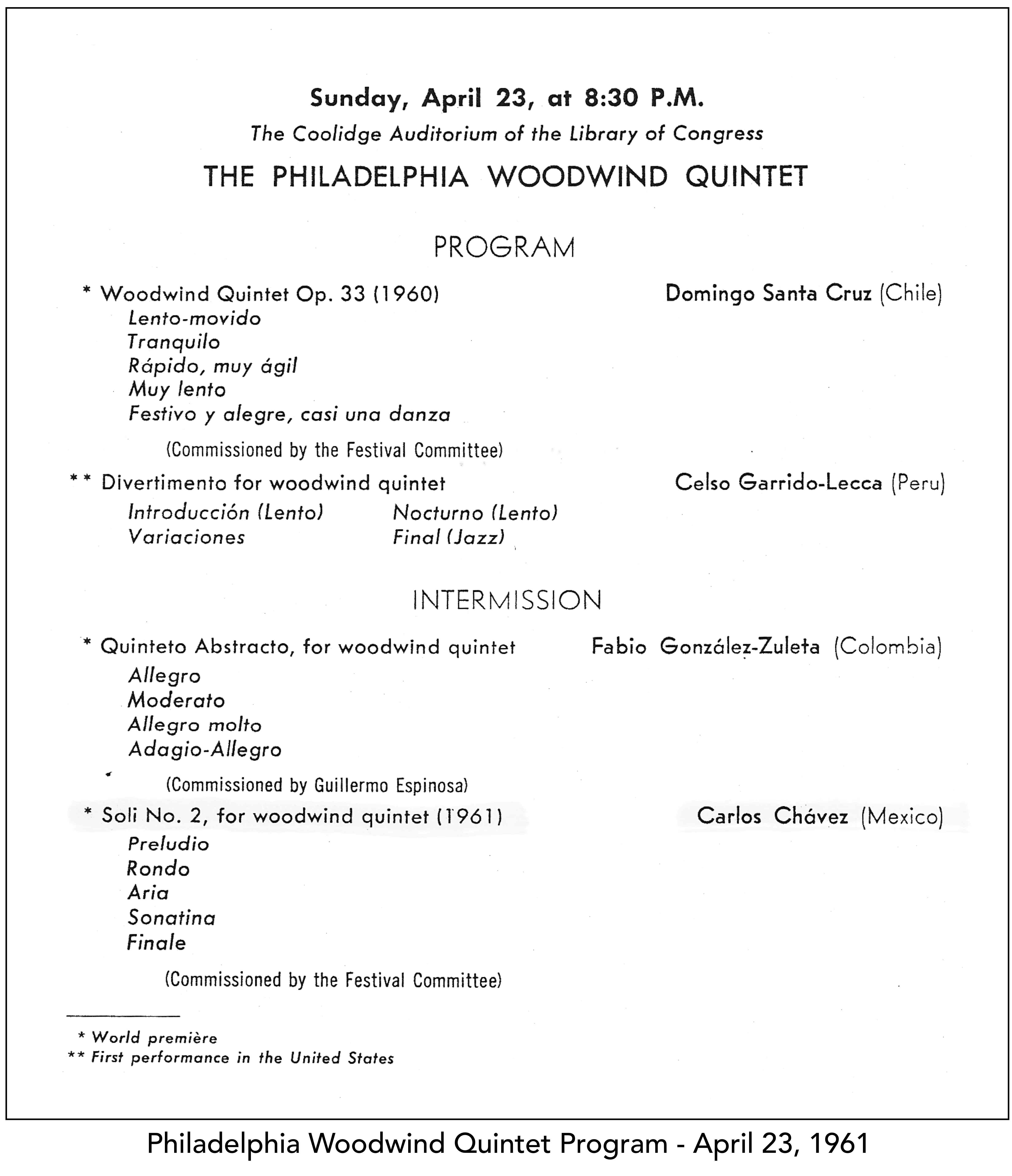Clicking on any of the above names takes you to that composer's page on our website.
The Philadelphia Woodwind Quintet and the Second Inter-American Music Festival.
With Jacqueline Kennedy as its Honorary Chair, the Second Inter-American Music Festival took place during the week of April 22-30, 1961 in Washington, DC. Not unlike the First Inter-American Festival from three years earlier, the second festival had as its primary goal the advancement of hemispheric cooperation through music.
Unlike the first festival, however, this time there was far more intellectual music, and correspondingly less of the musical stereotypes, a characteristic that was duly summarized by critic Charles Crowder in the Musical America magazine:
“The great portion was nervous, noisy, and percussive, but in a peculiarly sophisticated way: the texture of the music was of a complexity geared to challenge the intellect rather than to please the senses. [...] No jungle drums here, but rather a highly intellectual exercise for performer and listener.”
Along with some of the most prestigious orchestras of the Americas, the festival also included the participation of several smaller ensembles, such as the Claremont String Quartet, a Mexican madrigal choir and the Philadelphia Woodwind Quintet. This latter group, on April 23, 1961, in the Coolidge Auditorium of the Library of Congress, performed a program of Latin American music for wind quintet by Chilean composer Domingo Santa Cruz, Peruvian Celso Garrido-Lecca , Colombian Fabio González-Zuleta and Mexican Carlos Chávez. , Colombian Fabio González-Zuleta and Mexican Carlos Chávez.
Although the members of the Quintet, Robert Cole, flute; John de Lancie, oboe, Anthony Gigliotti, clarinet; Mason Jones, horn; and Sol Schoenbach, bassoon, were described by Ross Parmenter in the New York Times as “super-expert instrumentalists,” for some reason Parmenter was surprised not only by the way in which the ensemble applauded the composers who were present but also how the members of the Quintet “enjoyed performing the works and were glad they had been written.”
Writing for the Washington Post, Paul Hume also noted the exceptional ability of the Philadelphians, but unlike Parmenter, seemed to be more favorably disposed towards the music. Regarding González-Zuleta’s Abstract Quintet, for example, Hume remarked that “throughout the quintet the hand of a master contemporary contrapuntist is clearly working with a keen ear and powerful effect.” However, more nuanced criticism can be detected in the words of fellow South American Juan Orrego-Salas, who wrote in the Inter-American Music Bulletin that in the Colombian’s music “a dubious attitude between abstraction and nationalism is still holding him back. Nevertheless, his recent Abstract Quintet for woodwinds is certainly a step forward and a consistent proof of skill and talent.”
The reel-to-reel tape recording of this concert, held by the Library of Congress, was used to create a digital preservation master in 2004. However, several of the selections from this program, most notably the Chávez piece, have been recorded by other ensembles.
|
|
 Would you like to learn about our various projects and activities? How about what our composers are doing around the world? Yes? Then be sure to sign up for our monthly newsletter, the Cayambis Connection. Subscribers get special promotions and discounts, too. Would you like to learn about our various projects and activities? How about what our composers are doing around the world? Yes? Then be sure to sign up for our monthly newsletter, the Cayambis Connection. Subscribers get special promotions and discounts, too.
|
|
|


